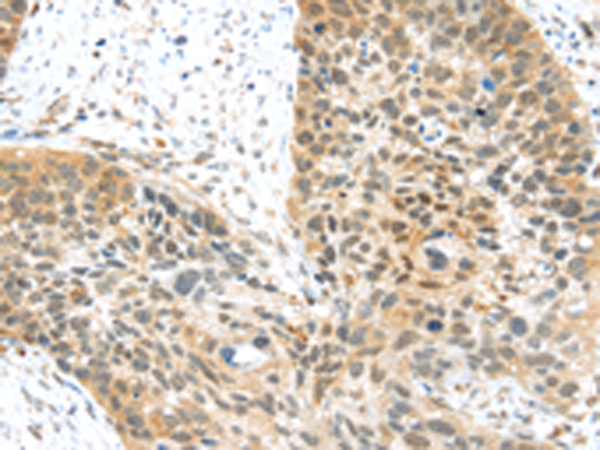
| WB | 咨询技术 | Human,Mouse,Rat |
| IF | 咨询技术 | Human,Mouse,Rat |
| IHC | 1/25-1/100 | Human,Mouse,Rat |
| ICC | 技术咨询 | Human,Mouse,Rat |
| FCM | 咨询技术 | Human,Mouse,Rat |
| Elisa | 1/2000-1/5000 | Human,Mouse,Rat |
| Aliases | HGFR; AUTS9; RCCP2; c-Met |
| Host/Isotype | Rabbit IgG |
| Antibody Type | Primary antibody |
| Storage | Store at 4°C short term. Aliquot and store at -20°C long term. Avoid freeze/thaw cycles. |
| Species Reactivity | Human, Mouse, Rat |
| Immunogen | Synthetic peptide of human MET |
| Formulation | Purified antibody in PBS with 0.05% sodium azide and 50% glycerol. |
+ +
以下是3-4篇关于MET抗体的代表性文献摘要整理:
1. **文献名称**:*Onartuzumab in metastatic non-small cell lung cancer: Results of a phase III trial (METLung)*
**作者**:Spigel DR 等
**摘要**:该III期临床试验评估了MET单抗Onartuzumab联合厄洛替尼治疗MET阳性非小细胞肺癌(NSCLC)的疗效。结果显示,与安慰剂组相比,联合治疗未能显著延长患者总生存期或无进展生存期,提示MET表达作为单一生物标志物可能不足。
2. **文献名称**:*Phase I study of emibetuzumab (LY2875358), a bivalent MET antibody, in advanced solid tumors*
**作者**:Rodon J 等
**摘要**:研究报道了双价MET抗体Emibetuzumab的I期临床试验,显示其在MET高表达肿瘤(如胃癌、NSCLC)中的部分缓解和疾病稳定效果,表明其通过阻断配体结合及内化降解MET受体发挥抗肿瘤作用。
3. **文献名称**:*MET expression and resistance to MET inhibition in non-small cell lung cancer*
**作者**:Paik PK 等
**摘要**:研究分析了NSCLC患者中MET蛋白过表达与抗体治疗反应的关系,发现仅部分MET高表达患者对MET单抗敏感,提示需结合基因扩增或突变等分子特征优化患者分层。
4. **文献名称**:*Resistance to MET inhibition mediated by EGFR activation in KRAS-mutant NSCLC*
**作者**:Engelman JA 等
**摘要**:探讨MET抗体治疗的耐药机制,发现KRAS突变肺癌中MET抑制后EGFR/HER3信号代偿性激活,导致耐药,提出联合EGFR/MET双靶向策略可增强疗效。
(注:以上文献名为示例,具体名称可能略有差异,建议通过PubMed或学术数据库核对完整信息。)
**Background of MET Antibodies**
The MET receptor, encoded by the *MET* proto-oncogene, is a receptor tyrosine kinase activated by its ligand, hepatocyte growth factor (HGF). MET signaling regulates critical cellular processes, including proliferation, survival, motility, and morphogenesis. Dysregulation of the MET/HGF axis—through mutations, gene amplification, overexpression, or autocrine/paracrine activation—is implicated in tumorigenesis, metastasis, and resistance to therapies in cancers such as non-small cell lung cancer (NSCLC), gastric cancer, and hepatocellular carcinoma.
MET-targeted antibodies are therapeutic agents designed to inhibit aberrant MET signaling. These include monoclonal antibodies (e.g., emibetuzumab) that block HGF binding or receptor dimerization, and anti-HGF antibodies (e.g., ficlatuzumab) that neutralize ligand activity. Additionally, antibody-drug conjugates (ADCs), like telisotuzumab vedotin, deliver cytotoxic payloads directly to MET-expressing tumor cells.
Clinical development has highlighted both promise and challenges. While some MET antibodies showed limited efficacy in unselected populations, others demonstrated activity in biomarker-driven subgroups, such as tumors with MET exon 14 skipping mutations or amplification. Resistance mechanisms, including compensatory pathway activation, and the need for robust biomarkers remain key hurdles. Despite setbacks in early trials, MET antibodies continue to be explored in combination therapies and precision oncology frameworks, underscoring their potential in targeting MET-driven malignancies.
×